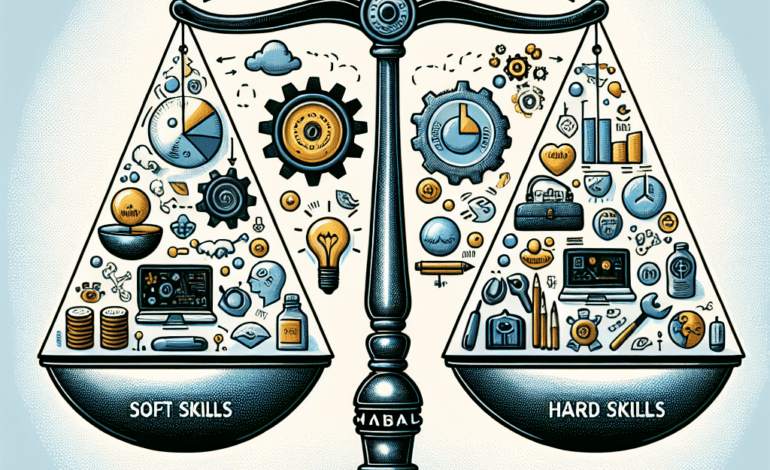Soft Skills vs. Hard Skills: What Employers Value Most

Table of Contents
- Introduction
- Soft Skills Defined
- Hard Skills Defined
- Importance of Soft Skills
- Importance of Hard Skills
- Balance in the Workplace
- Conclusion
- FAQs
Introduction
In today’s competitive job market, the debate over the importance of soft skills versus hard skills is ongoing. Both are essential components of a well-rounded professional, and each offers unique benefits. While hard skills can be learned and measured, soft skills are often innate and harder to quantify. This article delves into the definition, importance, and balance of these skills in the workplace.
Soft Skills Defined
Soft skills, often referred to as interpersonal or people skills, encompass a range of non-technical abilities that relate to how you interact with others. These skills include:
- Communication
- Teamwork
- Problem-solving
- Time management
- Adaptability
- Emotional intelligence
Unlike hard skills, which are specific to a particular job, soft skills are transferable across various roles and industries.
Hard Skills Defined
Hard skills are specific, teachable abilities or knowledge sets that are job-specific. These skills can often be learned through education, training programs, or on-the-job experience. Examples of hard skills include:
- Proficiency in a foreign language
- Computer programming
- Data analysis
- Project management
- Technical writing
- Mathematical skills
Hard skills are typically easy to quantify and can often be demonstrated through degrees, certifications, or hands-on experience.
Importance of Soft Skills
Soft skills are increasingly recognized as crucial to long-term career success. Employers value these skills highly for several reasons:
- Effective Communication: Clear and concise communication reduces misunderstandings and enhances team collaboration.
- Teamwork and Collaboration: The ability to work well with others is essential in a team-oriented environment.
- Problem Solving: Employees with strong problem-solving skills can navigate challenges and find effective solutions.
- Adaptability: In a rapidly changing work environment, being flexible and adaptable is a valuable trait.
- Leadership: Leaders with strong soft skills can inspire and motivate their teams, leading to increased productivity.
Importance of Hard Skills
While soft skills are crucial, hard skills should not be underestimated. They are equally important for several reasons:
- Job Competency: Hard skills ensure that an employee can perform the technical aspects of their job effectively.
- Specialization: Employers often seek candidates with specific hard skills to fulfill certain job requirements.
- Efficiency: Proficiency in hard skills can lead to improved efficiency and productivity in the workplace.
- Measurable Results: Hard skills are easier to evaluate and measure, making it simpler for employers to assess competency.
Balance in the Workplace
Employers increasingly look for a balance of soft and hard skills in their employees. While hard skills are necessary for task completion, soft skills contribute to a positive work environment and enhanced team dynamics. A balanced skill set ensures that an employee can not only perform their job effectively but also collaborate well with others and contribute to the overall success of the organization.
| Soft Skills | Hard Skills |
|---|---|
| Communication | Data Analysis |
| Teamwork | Computer Programming |
| Problem-solving | Project Management |
| Time Management | Technical Writing |
| Adaptability | Mathematical Skills |
Conclusion
In summary, both soft skills and hard skills are essential in the modern workforce. While hard skills enable employees to perform specific tasks, soft skills facilitate effective communication, teamwork, and problem-solving. Employers value a balance of both, as this combination leads to a more competent and harmonious workplace. Job seekers should strive to develop and showcase a blend of these skills to enhance their employability and career success.
FAQs
What are the key differences between soft skills and hard skills?
Soft skills relate to interpersonal abilities and how you interact with others, while hard skills are specific, teachable abilities or knowledge sets that can be measured and quantified.
Can soft skills be learned?
Yes, soft skills can be developed and improved over time through practice, training, and self-awareness. While some individuals may naturally possess strong soft skills, others can acquire them through conscious effort and experience.
Why do employers value soft skills?
Employers value soft skills because they contribute to a positive work environment, enhance teamwork and collaboration, improve communication, and help in problem-solving and adaptability within the organization.
How can I showcase my soft and hard skills to potential employers?
To showcase your skills, include them in your resume, provide specific examples in your cover letter, and highlight them during interviews. Demonstrating both types of skills through real-life examples and achievements can make a strong impression on employers.
Which is more important: soft skills or hard skills?
Both soft skills and hard skills are important. A successful professional typically possesses a balance of both, allowing them to perform their job effectively while also contributing positively to the work environment and team dynamics.



